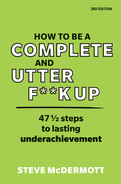Introduction
Often the hardest thing to change is how you think. I’m from the county of Yorkshire, England. So is my wife’s Uncle Richard. Now in case you don’t know, folk from Yorkshire are known for their down-to-earth, no-nonsense approach to life (others would call us opinionated but they’d be wrong).
Anyway, I’m in the local pub – The Gaping Goose – with Uncle Richard and he’s telling me that his wife, Aunty Anne-Marie, is having a minor eye operation. It’s the one where they use a laser to correct your vision, and the surgeon has said she should be able to see, without the aid of spectacles, within 24 hours. Uncle Richard is finding this hard to believe.
I tell Uncle Richard, “I know why that is.” You see, coincidentally, yesterday I was speaking at a conference where one of the speakers was an American lady who was a world-renowned expert on alternative health treatments. She talked about how she had cured herself of a tumour the size of a basketball growing in her abdomen in, get this, just six weeks. She explained that through cell regeneration all of us get an entirely new body over a period of time, and that different parts of us regenerate at different speeds.
For instance, she pointed out that if you’ve ever had a suntan, you’ll know it takes about two weeks to fade. That’s because it takes the cells in your skin about two weeks to replace themselves totally with new cells. She then went on to say that your liver takes about three months, your stomach lining three weeks and your eyeball about 24 to 48 hours. So, although it feels hard when you poke it, in fact it’s a whole new eyeball.
In case you’re interested, she went on to say how come, then, we get disease? How come if we have a diseased liver our body doesn’t just replace it with a healthy one? The answer, she said, is that each cell in your body carries a programme or a memory. Somehow disease causes this programme to be altered, and so instead of regenerating healthy tissue and organs, we now continue to replicate unhealthy ones. To cure herself of her tumour in such a short space of time, she believed that, somehow, she had developed the ability to interrupt the programme and reprogramme her cells back to the healthy memory.
Now when I told Uncle Richard all of this, do you know what he said? He said, “Bollocks”. (This is a popular Yorkshire swear word that refers to a part of the male anatomy.)
Now I don’t want you to think that you need to have any more of an open mind than Uncle Richard to get the most out of this guide. Don’t stop thinking what you’ve always thought – that way you’ll only learn what you already know. Or as JohnKenneth Galbraith said, “Faced with the choice between changing one’s mind and proving that there is no need to do so, almost everyone gets busy on the proof.”

This guide originally began life with me pondering some profound questions like: “What is the secret to becoming an outstanding fuck-up?” “Can anyone become a fuck-up?” “Having become a fuck-up, how do you remain so, year after miserable year?” and “Why does sour cream have a sell-by date?” You’ll find the answers to all these questions, apart from the last one, in these pages.
Having studied individuals, from all walks of life, who have massively underachieved, I’ve come to the startling conclusion that all these very different people share the exact same strategies for fucking it right up. It’s these strategies they use each and every day in order to become absolute wasters and washouts.
True failure, however, comes at a price. Did you know that it can take a lot more work and energy to become a complete and utter useless loser in life, work and everything, than it can to become an outstanding success? That’s because among other things, as we’ll discover later, successful people don’t ever feel like they work for a living, whereas most folks dislike or even hate their jobs and sweat blood and tears to get nowhere fast or, if they are really good, even to go backwards.
What did I learn when I examined some of our best, most natural failures? Well, just look at most of your relatives, friends and colleagues. For this select band, being a bit rubbish is as easy as breathing. To them it’s as easy to fail as it is to put the alarm clock on snooze for just a few more minutes. And of course the truth is that, for most of us, failure is an unconscious process. We fail without having to think about it. Over the next few minutes,I will clearly show you what outstanding fuck-ups think, say and consistently do, or most of the time don’t do, to screw up their chances of success.
Of course, for the sake of balance, for many years I’ve studied successful organisations and individuals too. I figure if we know their specific strategies for success, and then do the exact opposite, this will get us way beyond the level of mediocre failure. Although,I know most of you would be delighted to settle for that.
In this guide at last I will reveal the secret, yet simple, tried, tested and proven steps that, should you follow them, are guaranteed to propel you into the slow lane of total inadequacy.
I wish you every success on your journey to becoming someone who sucks.

PS The good news is that you may already have a head start in the race to see who can fuck up fastest. In a survey, 10% of people in the UK thought they would be better off dead, 25% could see no hope for the future and 33% described themselves as downright miserable most of the time. If you are already part of this 68% majority, well done, your failure is already assured.
